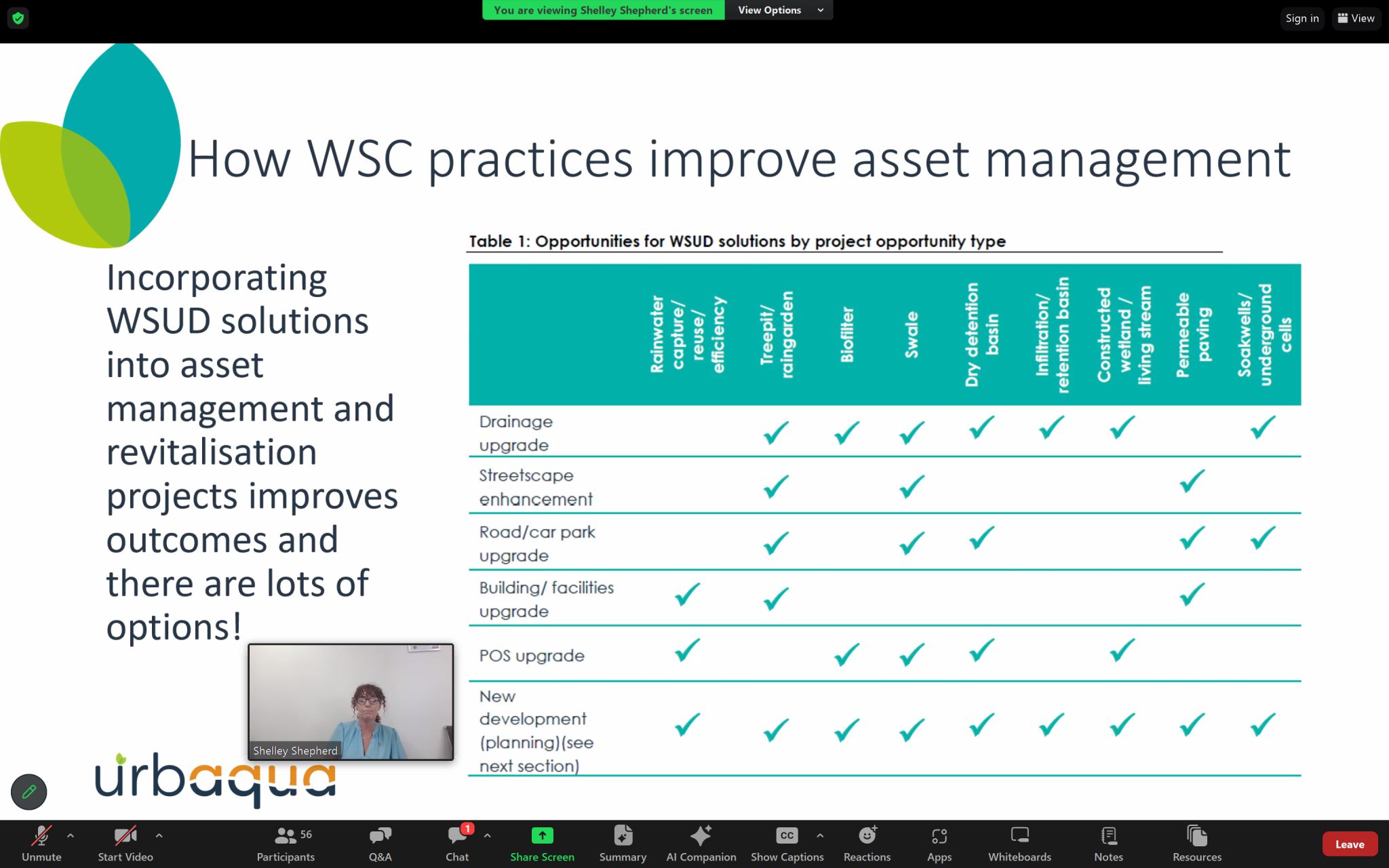Engaging local governments on water sensitive solutions and practices

In a bid to engender more support for water sensitive city principles and practices among Perth’s councilors and senior executives, one project is designing an engagement package to bolster decision-makers’ understanding of water sensitive urban design and practice.
The Perth Water Sensitive Transition Network identified a need for informed leadership on achieving the water sensitive city vision, and through Water Sensitive Cities Australia’s (WSCA), engaged Urbaqua Principal Environmental Planner and AWA Board Director Shelley Shepherd to develop key messaging, tools and tactics to help better engage local government and business leaders.
Presenting the project during a WSCA webinar hosted by Monash University, Shepherd said that water sensitive solutions are fundamental to the health and wellbeing of the community and the environment, but often are treated as a ‘nice to have’.
“The project is about changing the culture of organisations, particularly local governments, to recognise water sensitive solutions as critical to creating healthy environments, as well as providing urban cooling and green public amenity, and viewing these solutions not as an expense, but an investment,” she said.
“Water sensitive solutions also support the delivery of other environmental priorities that require progress reporting including climate change disclosures, ESG reporting and progress towards the Sustainable Development Goals.
“It’s possible to incorporate water sensitive solutions into almost any capital works project that occurs, but people sometimes don't know what that means or what they can do.”
Shepherd said supporting the adoption and implementation of water sensitive solutions across all types of projects is crucial for Perth, given the city and region’s long history of declining rainfall.
“Our context in WA is different to the rest of the country in terms of water security. We've had more exposure to the fact that we are running out of water and that it doesn't always fall out of the sky anymore,” she said.
“Our water security is supported by multiple sources including desalination and groundwater replenishment with treated wastewater. We water our public spaces for almost no cost, but that water comes from the ground.
“Unfortunately, we're now seeing declining access to our groundwater resources because it's not recharging as fast as it used to. In some instances, our aquifers are also over allocated. We need to be doing everything we can to use water as wisely as possible.”

Engagement focus
Shepherd said the key audience for the engagement program are mayors, councilors and senior executives.
“We have a suite of capacity building programs that have been sharing knowledge about water sensitive practices for quite a long period of time. But everybody is resource poor, time poor,” she said.
“How do we convince somebody that there is value in investing in training about something that seems to be just a ‘nice to have’?
“We have many policy levers, such as the WA Climate Policy and Climate Adaptation Strategy. There's a significant review being undertaken of the Swan Canning River Protection Strategy, and we have been working very hard on updating our state planning policy for water, which is another critical part of our planning system.”
Shepherd noted that a lot of work has gone into achieving water security in Perth.
“There is this recognition that creating water security is already happening, that we don't need to worry about water anymore,” she said.
“But access to scheme water is not the only water management issue we have to think about. We also need water for our environments and to provide cool, green places for recreation and community amenity.
“Unfortunately, water management is not all that sexy. So we need to link it to something that will reach the unconverted. We have to link these water management issues to local government roles and responsibilities. And one of the key areas that we recognise as being critical is the management of local government assets.
“We need to showcase how water sensitive solutions are absolutely critical to creating quality urban spaces to support healthy communities.
“We also have a strong desire to move towards a circular economy and resource recovery. So there are plenty of opportunities where water sensitivity messages could really help focus conversations moving forwards.”
Meaningful messaging
The engagement program’s key message for government and executive stakeholders is around the benefits of water sensitive solutions and practices for organisations and the community, as well as the culture needed to achieve them, Shepherd said.
“We want to see an organisational culture that embraces water sensitivity at the planning and delivery stages, so it frames asset renewal. Capital works provide such a big opportunity to embed water sensitivity into our urban areas,” she said.
Shepherd said the messaging also supports a base-line of understanding about water sensitive cities, as well as the benefits of the approach and the need for a more open mindset when it comes to trialing new approaches.
“It’s important to develop a common understanding of how the principles and practices of water sensitive cities should be applied and that by following such an approach, communities and local government will actually see long term benefits,” she said.
“We outline what the principles of water sensitive cities are in a WA context, talk through some of the common solutions and identify the risks to water resources, the local government and the community if we don’t start implementing water sensitive solutions and practices now.
“We also explain why developing a water sensitive culture is really important at all levels of planning and operation.
“We have found that water sensitive solutions and practices are really taking off in local governments where the executive supports its officers to trial some of these solutions.”
Shepherd said the importance of shifting organisational culture towards trialing water sensitive solutions and practices is not to be underestimated, as each solution must be tailored to the local context and therefore requires testing practices within new scenarios.
“We recognise that water sensitive city approaches are very much about local context. What one local government does, another might not. What you do in one suburb will be different to what you do in another,” she said.
“It’s difficult to have a standard design or process that outlines exactly what you have to do. This means we really do need cultures that support trying things out, that are open to failing and learning.”
